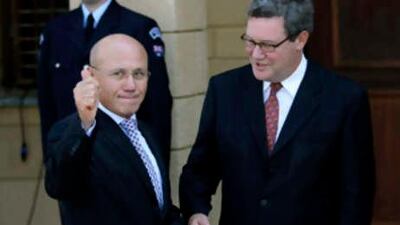Rival Cypriot leaders met today for the formal launch of intensive UN-backed negotiations to reunify the divided Mediterranean island, after three decades of failed diplomacy. Both seen as pro-settlement moderates, president Demetris Christofias, a Greek Cypriot, and the Turkish Cypriot leader Mehmet Ali Talat, have met five times this year in a renewed push for unity. "Today is an historic day for Cyprus," said the UN chief Ban Ki-moon's special envoy, former Australian foreign minister Alexander Downer, who was at the launch of the talks in the UN-patrolled buffer zone of Nicosia.
Mr Downer said "significant progress" had been made to build confidence and create a solid foundation for the negotiations, which mark the first major push for peace on the island since a failed UN peace plan in 2004. "There have been difficult moments over the past months and there will likely be further difficulties and challenges ahead. At the same time, the Cyprus problem is not insurmountable and the negotiations which begin today can and must have a successful outcome," he said.
Today's meeting is likely to deal with procedural matters and substantive negotiations are to begin on Sept 11, with Mr Christofias and Mr Talat expected to meet at least once a week. The negotiation process has an open-ended timeline but the UN has warned that the talks cannot go on indefinitely without tangible progress. The build-up to the talks has been clouded by the refusal of Turkish Cypriot authorities to allow Greek Cypriot pilgrims to travel via a town in the remote northwest of the island to attend a church service.
However, hundreds of Turkish and Greek-Cypriot peace activists rallied on Monday night in the capital's buffer zone chanting for a reunified Cyprus. Mr Talat, meanwhile, has raised the possibility of a settlement by the end of 2008. "It depends on the Greek-Cypriot side, if they have the will I am sure we can find a solution by the end of the year," he said in a television interview on Monday. He insisted that any deal would have to provide for two politically-equal "constituent states", a concept which has been unpopular among the Greek-Cypriot community which makes up more than 80 per cent of the island's population.
Preparatory talks at committee level since March have been accompanied by confidence-building measures, notably the opening of a crossing in Ledra Street linking south and north in the symbolic heart of old Nicosia. It is the first intensive push for peace since a UN reunification plan was approved by Turkish Cypriots but overwhelmingly rejected by Greek Cypriots, just a week before the island joined the European Union in 2004.
Optimists are pinning their hopes on the personal chemistry and shared left-wing politics of the two leaders. Mr Christofias, who heads the communist-rooted Akel party, was elected in February on a platform of relaunching peace efforts. Mr Talat, who heads the leftist Republican Turkish Party, led the Turkish Cypriot "yes" vote in 2004. Any agreement the leaders reach will then have to be sold to the two communities in simultaneous referendums.
Cyprus has been divided since 1974 when tens of thousands of Turkish troops occupied its northern third in response to an Athens-engineered Greek Cypriot coup seeking union with Greece. The Turkish capital Ankara has always insisted on retaining the right to intervene that it obtained along with London and Athens, in the treaties which gave the island independence from Britain in 1960. * AFP

